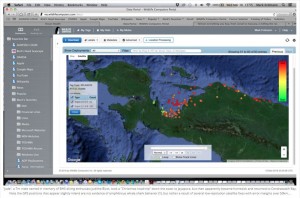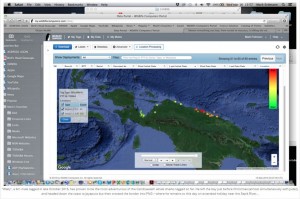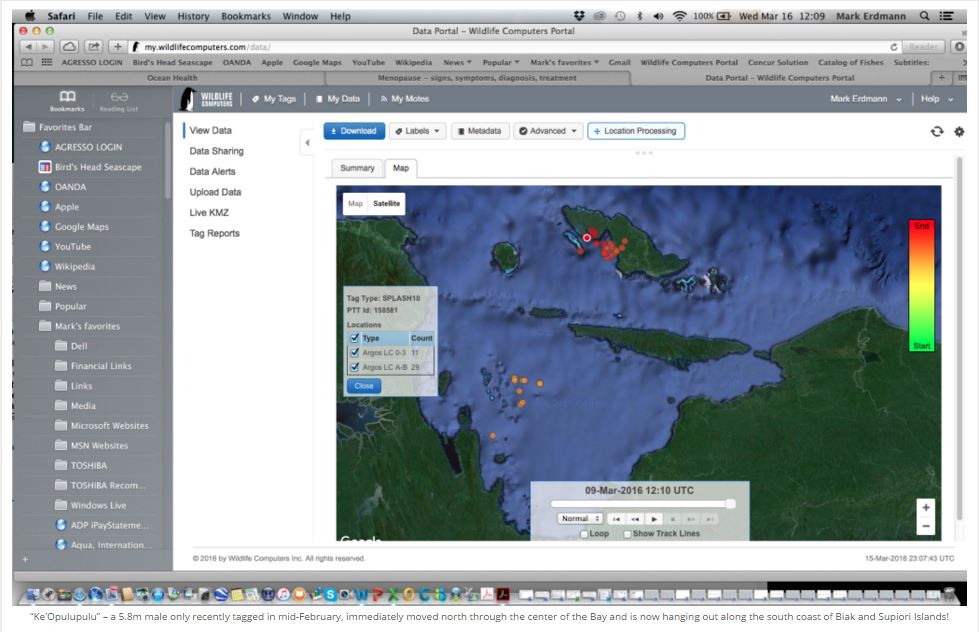Marine Life & Conservation
Cendrawasih’s whale sharks…. not such homebodies after all

For the past five years, Cendrawasih Bay’s friendly whale shark population has been attracting a lot of attention, primarily because of the near-certainty of having outstanding (and lengthy!) whale shark encounters during a visit to the region. Unlike many of the other known whale shark aggregations in the world (such as Ningaloo, Isla Mujeres, Belize, Galapagos and Donsol), which are highly seasonal, we now know with certainty that Cendrawasih has whale sharks present in the bay year round. Indeed, based on our observations combined with photos submitted by visitors to our BHS whale shark database, some highly-recognizeable individuals seem to be present throughout the year. Of course, one of the surest ways to confirm this is to monitor individual animals’ movements through satellite tagging – which is exactly what we’ve been doing in collaboration with the Cendrawasih Bay National Park Authority and Pak Bram Maruanaya and his local Kalilemon homestay in Kwatisore.
 Since June 2015, we’ve been able to tag 15 male whale sharks (ranging in size from 3 to 7 m in length) from Cendrawasih, using custom-made fin-mounted satellite tags by Wildlife Computers. These fin-mount tags have extended battery life which we hope will provide data for up to two years, and we’ve been delighted with their performance to date. All but one of the tags has been transmitting data very regularly (on average every 2-5 days) – basically each time one of the tagged sharks spends enough time on the surface for the tag to uplink to the ARGOS satellite network.
Since June 2015, we’ve been able to tag 15 male whale sharks (ranging in size from 3 to 7 m in length) from Cendrawasih, using custom-made fin-mounted satellite tags by Wildlife Computers. These fin-mount tags have extended battery life which we hope will provide data for up to two years, and we’ve been delighted with their performance to date. All but one of the tags has been transmitting data very regularly (on average every 2-5 days) – basically each time one of the tagged sharks spends enough time on the surface for the tag to uplink to the ARGOS satellite network.
As previously reported back in November, the initial data received from June through October 2015 seemed to confirm what many suspected – that Cendrawasih whale sharks are largely “homebodies”, preferring to stay close to shore and feed upon the abundant ikan puri baitfish schools that abound in the coastal bays and estuarine areas of the southern and eastern coastlines of Cendrawasih. Which of course is a great thing for BHS marine tourism, as it means visitors can pretty much plan a trip any time of the year and have a very good chance of excellent whale shark interactions.
By December, however, we started to observe some very different behaviours that indicate Cendrawasih’s whale sharks might not be such homebodies after all! Just before Christmas, four of the sharks almost simultaneously moved towards the small exit to the bay between the eastern tip of Yapen Island and the Papuan mainland. Though two soon turned back, both “Jude” and “Wally” proceeded down the coastline towards Jayapura. Jude eventually turned back and returned to Kwatisore, but Wally continued down the coast – becoming the first of our tagged sharks to become an international visitor when he crossed into PNG waters in early January. While he appeared at one point to be returning to Cendrawasih (making it as far west as Jayapura), he’s since returned to the Wewak region of PNG (near the Sepik River outlet) and seems to be happily enjoying an extended vacation there!
Similarly, one of our most recently tagged whale sharks, Ke’Opulupulu, headed almost immediately north into the center of the Bay (near the Auri Islands and atolls), then navigated to the south coast of Biak and Supiori Islands, where he’s remained for the past few weeks.
But horizontal movements are only part of the excitement we’ve recently recorded. The past 3 months have also seen a dramatic increase in deep-diving behaviour of many of our tagged sharks. While we did previously report a 672m deep diving record in October, we’ve now seen four of our sharks venture below 1000m depth, with the aptly-named “Moby” smashing the depth record (but fortunately not his tag’s depth gauge!) at 1416m!!! Even the “wee” 3m “Fijubeca” has dived to 700m depth. It’s still not clear why the sharks have shown such deep diving behaviour over the past few months – perhaps the El-Nino warmed surface waters are not providing enough food and they are searching for deeper plankton…
Overall, we’re delighted to see these fin-mount tags proving so successful at divulging some of the secrets of Cendrawasih’s whale sharks. Its particularly noteworthy that the first 5 months’ of data seemed to simply confirm our scattered direct observations, but the past 4 months have revealed numerous exciting behaviours we didn’t expect. Who knows what the next few months’ data might reveal? Stay tuned and we’ll happily report back as the data keeps flowing in. And please remember – you too can contribute to our expanding knowledge and understanding of the charismatic megafauna of the Bird’s Head by contributing your photo IDs and observations of whale sharks and manta rays in the region to the databases maintained by our site.
Mark Erdmann is Conservation International’s Vice President of Asia Pacific Marine Programs. Though now based in New Zealand after 23 years in Indonesia, he is still intimately involved with the Bird’s Head Seascape and frequently disappears into its remote corners for weeks on end….
Shawn Heinrichs is an Emmy Award-winning cinematographer, photographer and marine conservationist. An independent filmmaker, he is the founder of Blue Sphere Media, a production company specializing in underwater, adventure and conservation media. His work was recently featured in the film Racing Extinction.
A special thanks to Audrey, Shannon and Dennis Wong, Sally Timpson, and the management and guests of the True North expedition vessel for generously sponsoring the fin-mount whale shark satellite tags reported here, to Patti Seery and her amazing staff and crew of the Si Datu Buah liveaboard for hosting our most recent deployment expedition, and to OceanMax for continuing to support the tagging program with PropSpeed silicone foul-release coating for our satellite tags.
Marine Life & Conservation
Double Bubble for Basking Sharks

 The Shark Trust is excited to announce that, for two more days only, all donations, large or small, will be doubled in the Big Give Green Match Fund!
The Shark Trust is excited to announce that, for two more days only, all donations, large or small, will be doubled in the Big Give Green Match Fund!
Donate to Basking in Nature: Sighting Giants
The Shark Trust is hoping to raise £10k which will be doubled to £20k. This will go towards Basking in Nature: Sighting Giants. And they need YOUR help to reach they’re goal.
The Shark Trust’s citizen science project is to monitor and assess basking sharks through sightings; encouraging data collection, community engagement, and promoting nature accessibility. This initiative aims to enhance health and wellbeing by fostering a deeper connection with British Sharks.
Campaign Aims
- Increase citizen science reporting of Basking Sharks and other shark sightings to help inform shark and ray conservation.
- Provide educational talks about the diverse range of sharks and rays in British waters and accessible identification guides!
- Create engaging and fun information panels on how to ID the amazing sharks and rays we have on our doorstep! These can be used on coastal paths around the Southwest. With activities and information on how you can make a difference for sharks and rays!
- Promote mental wellbeing through increasing time in nature and discovering the wonders beneath the waves!
Donate, and double your impact. Click Here
Marine Life & Conservation
Leading UK-based shark conservation charity, the Shark Trust, is delighted to announce tour operator Diverse Travel as a Corporate Patron

 Corporate Patrons provide a valuable boost to the work of The Shark Trust. The Trust team works globally to safeguard the future of sharks, and their close cousins, the skates and rays, engaging with a global network of scientists, policymakers, conservation professionals, businesses and supporters to further shark conservation.
Corporate Patrons provide a valuable boost to the work of The Shark Trust. The Trust team works globally to safeguard the future of sharks, and their close cousins, the skates and rays, engaging with a global network of scientists, policymakers, conservation professionals, businesses and supporters to further shark conservation.
Specialist tour operator Diverse Travel has operated since 2014 and is committed to offering its guests high quality, sustainable scuba diving holidays worldwide. Working together with the Shark Trust will enable both organisations to widen engagement and encourage divers and snorkellers to actively get involved in shark conservation.
“Sharks are truly at the heart of every diver and at Diverse Travel, we absolutely share that passion. There is nothing like seeing a shark in the wild – it’s a moment that stays with you forever!” says Holly Bredin, Sales & Marketing Manager, Diverse Travel.
“We’re delighted to celebrate our 10th year of business by becoming a Corporate Patron of the Shark Trust. This is an exciting partnership for Diverse and our guests. We will be donating on behalf of every person who books a holiday with us to contribute towards their vital shark conservation initiatives around the world. We will also be working together with the Trust to inspire divers, snorkellers and other travellers to take an active role – at home and abroad – in citizen science projects and other activities.”
Paul Cox, CEO of The Shark Trust, said:
“It’s an exciting partnership and we’re thrilled to be working with Diverse Travel to enable more divers and travellers to get involved with sharks and shark conservation. Sharks face considerable conservation challenges but, through collaboration and collective action, we can secure a brighter future for sharks and their ocean home. This new partnership takes us one more valuable step towards that goal.”
For more information about the Shark Trust visit their website here.
For more about Diverse Travel click here.
-

 News3 months ago
News3 months agoHone your underwater photography skills with Alphamarine Photography at Red Sea Diving Safari in March
-

 News3 months ago
News3 months agoCapturing Critters in Lembeh Underwater Photography Workshop 2024: Event Roundup
-

 Marine Life & Conservation Blogs3 months ago
Marine Life & Conservation Blogs3 months agoCreature Feature: Swell Sharks
-

 Blogs2 months ago
Blogs2 months agoMurex Resorts: Passport to Paradise!
-

 Blogs2 months ago
Blogs2 months agoDiver Discovering Whale Skeletons Beneath Ice Judged World’s Best Underwater Photograph
-

 Gear Reviews2 weeks ago
Gear Reviews2 weeks agoGEAR REVIEW – Revolutionising Diving Comfort: The Sharkskin T2 Chillproof Suit
-

 Marine Life & Conservation2 months ago
Marine Life & Conservation2 months agoSave the Manatee Club launches brand new webcams at Silver Springs State Park, Florida
-

 Gear Reviews3 months ago
Gear Reviews3 months agoGear Review: Oceanic+ Dive Housing for iPhone














